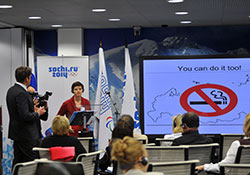Union of Tobacco-free Cities launched in Russian Federation

Sochi 2014 Organizing Committee
The Sochi 2014 Organizing Committee and WHO announced on 25 October 2012 the creation of a Union of Tobacco-free Cities in the Russian Federation. Representatives from Sochi, Moscow, St Petersburg, Kazan, Krasnoyarsk, Arkhangelsk and Novosibirsk all supported the proposal to create the Union, which will become an integral part of the Tobacco-free Cities and Healthy Cities initiatives developed by WHO.
The Union is tasked with protecting people from the harmful effects of tobacco consumption and second-hand smoke. It will also serve as a forum where representatives of regions within the Russian Federation can discuss tobacco control initiatives.
The 2014 Olympic Games, to take place in Sochi, Russian Federation, will be the twelfth Games to be tobacco free. This non-smoking policy will protect the more than 155 000 athletes, sports delegation representatives and volunteers at the 2014 winter event from daily second-hand smoke.
The conference organized to launch the Union was attended by delegates from 17 cities, representatives of legislative and executive authorities, the heads of administration of the participating cities, including the Mayor of Sochi, Anatoly Pakhomov, the heads of the federal and regional health ministries, as well as representatives of WHO/Europe and the International Union Against Tuberculosis and Lung Disease.
During the conference, the Sochi 2014 Organizing Committee demonstrated the results of its work to promote healthy living, sports and physical activity. The goals and performance objectives of the Union of Tobacco-free Cities were also presented, including implementation of a strategy to create a tobacco-free environment at local and regional levels and the creation of models to be used across the whole country.
The Union will take charge of promoting legislative and administrative regulations, which will enable participating cities to rid themselves of tobacco smoke and hopefully motivate other Russian cities to get involved in the creation of a more healthy environment.
Tobacco-free Olympic Games
Smoking has been an important issue for the International Olympic Committee (IOC) since 1988, when the Olympic Games became a strictly non-smoking event. Organizing Committees since that time have actively supported the non-smoking policy.
During the Winter Games in 2006, the Torino 2006 Organizing Committee, together with the Italian Center of Disease Prevention, distributed broadsheets with the slogan "I don't smoke – I'm a winner" and information available in four languages about the damage caused by smoking. In addition, information on the impact of smoking was disseminated in schools, and journalists were given media kits on the issue.
The Vancouver 2010 Organizing Committee, in collaboration with the Vancouver Coastal Health Research Institute, developed a large-scale anti-smoking campaign, which was implemented across the Olympic venues and in the public areas of the Canadian province of British Columbia. The campaign included announcements during the competitions about the harm of smoking, posting of relevant information on billboards and public transport, and an online campaign featuring special banners and information.
In 1993 the IOC and WHO signed their first partnership agreement, which was further strengthened in 2010 by the signing of a memorandum of understanding in the field of popularizing healthy lifestyles. One of the most important aspects of this collaboration has been to ensure that the Olympic Games be hosted in accordance with its non-smoking policy.



